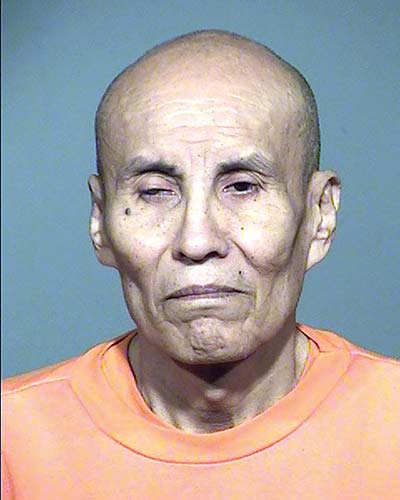GALLUP, N.M. — Clarence Dixon’s request to commute his scheduled execution was denied.

Dixon presented his case Thursday to the Arizona Board of Executive Clemency, asking the board and Arizona Gov. Doug Ducey, said Amanda Bass, who is representing him.
[NOTE: This article was originally published by the Navajo Times. Used with permission. All rights reserved.]
Dixon is scheduled to be executed on May 11.
“Dixon is not entitled to mercy from the state of Arizona,” Bass said of the rejection.
Dixon was convicted and sentenced to death for a 1978 sexual assault and murder of an Arizona State University student. His attorneys argue that he has a severe mental illness and is incompetent to be executed.
On Tuesday, Bass said they would file with the Pinal County Superior Court in Florence, Arizona.
RELATED: Navajo Man Scheduled for May 11 Execution
“We will present additional evidence of his severe mental illness and incompetency to be executed at his competency hearing in the Pinal County Superior Court,” Bass said.
Bass did not say what time Dixon’s competency hearing would be.
In June last year, Navajo Nation Attorney General Doreen McPaul wrote a letter to Arizona Attorney General Mark Brnovich, asking his office to consider the tribe’s traditional beliefs and its stance against the death penalty.
McPaul wrote the tribe’s culture and religion held life “sacred.”
“The death penalty removes the possibility of restoring harmony whereas a life sentence holds the opportunity to reestablish harmony and find balance in our world,” McPaul wrote to Brnovich.
Attorneys for Dixon say in addition to his severe mental illness, he is legally blind.
Lenny Foster, the former director of the Navajo Corrections Project, said he became acquainted with Dixon in 1988 at Dixon State Prison in Goodyear, Arizona.
Foster said Dixon has been facing the death penalty for 18-19 years and said, “It has to be a very hard psychological struggle for him.”
More Stories Like This
Native News Weekly (August 25, 2024): D.C. BriefsUS Presidents in Their Own Words Concerning American Indians
Two West Virginia Guardsmen Shot Near White House
Next on Native Bidaské: Chef Sean Sherman Talks “Turtle Island” and the Future of Indigenous Food
Deer Camp: A Family Tradition That Runs Deep
Help us tell the stories that could save Native languages and food traditions
At a critical moment for Indian Country, Native News Online is embarking on our most ambitious reporting project yet: "Cultivating Culture," a three-year investigation into two forces shaping Native community survival—food sovereignty and language revitalization.
The devastating impact of COVID-19 accelerated the loss of Native elders and with them, irreplaceable cultural knowledge. Yet across tribal communities, innovative leaders are fighting back, reclaiming traditional food systems and breathing new life into Native languages. These aren't just cultural preservation efforts—they're powerful pathways to community health, healing, and resilience.
Our dedicated reporting team will spend three years documenting these stories through on-the-ground reporting in 18 tribal communities, producing over 200 in-depth stories, 18 podcast episodes, and multimedia content that amplifies Indigenous voices. We'll show policymakers, funders, and allies how cultural restoration directly impacts physical and mental wellness while celebrating successful models of sovereignty and self-determination.
This isn't corporate media parachuting into Indian Country for a quick story. This is sustained, relationship-based journalism by Native reporters who understand these communities. It's "Warrior Journalism"—fearless reporting that serves the 5.5 million readers who depend on us for news that mainstream media often ignores.
We need your help right now. While we've secured partial funding, we're still $450,000 short of our three-year budget. Our immediate goal is $25,000 this month to keep this critical work moving forward—funding reporter salaries, travel to remote communities, photography, and the deep reporting these stories deserve.
Every dollar directly supports Indigenous journalists telling Indigenous stories. Whether it's $5 or $50, your contribution ensures these vital narratives of resilience, innovation, and hope don't disappear into silence.
 The stakes couldn't be higher. Native languages are being lost at an alarming rate. Food insecurity plagues many tribal communities. But solutions are emerging, and these stories need to be told.
The stakes couldn't be higher. Native languages are being lost at an alarming rate. Food insecurity plagues many tribal communities. But solutions are emerging, and these stories need to be told.
Support independent Native journalism. Fund the stories that matter.
Levi Rickert (Potawatomi), Editor & Publisher
